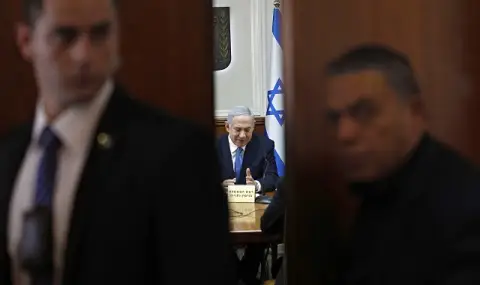The alleged Israeli strike against Iran, launched after days of prowling, was small and appeared to have been calculated to avoid the risks of a full-scale war, despite the very fact that what happened was a violation of the taboo on direct attacks, which Tehran also violated days earlier, reported Reuters, quoted by BTA.
Israeli Prime Minister Benjamin Netanyahu's military cabinet initially approved plans to strike Iranian territory on Monday night to respond with force to Iran's ballistic missile and drone attack last Saturday, but put the plans on hold at the last minute, three people familiar with the matter said. with the source events.
Then three voting members of the War Cabinet were ready to order the most drastic response – a strike against strategic sites, including Iranian nuclear sites, the destruction of which would certainly provoke a wider regional conflict, the sources said.
Facing a split in the cabinet and stronger warnings from partners including the US and the Gulf states that the conflict should not escalate, and aware of the need to preserve international sympathy for Israel, Israeli plans to retaliate have been shelved twice, the sources said. Two meetings of the military cabinet have also been postponed, government sources said.
Netanyahu's office has not yet commented on this information. Before the attack, a spokesman for the government's Directorate of National Public Diplomacy quoted Netanyahu as saying that Israel would defend itself in any way it saw fit.
Reuters spoke to dozens of sources in Israel, Iran and the Gulf region, as well as in the US, who described the six days of frantic efforts by the Gulf countries, the US and some Israeli military strategists to limit Israel's response to the first direct Iran's attack on its longtime rival after decades of shadow war. Most of the sources spoke on condition of anonymity because of the sensitivity of the matter.
This morning's suspected strike appears to have targeted an Iranian air base outside the city of Isfahan, deep inside the country and close enough to nuclear sites to send a message about how far Israel can go, but without using aircraft, ballistic missiles, and without hitting any strategic targets or causing major damage.
Iran said its air defense systems shot down three drones over a base near Isfahan early this morning. Israel said nothing about the incident. US Secretary of State Anthony Blinken indicated that the US was not involved in the attack.
An Iranian official told Reuters that there were indications that the drones were launched from Iranian territory by “insiders”, which could prevent the need for retaliation.
A source familiar with Western intelligence assessments of the incident also said preliminary evidence suggested Israel had launched the drones from Iranian territory. So far, there is no comment from the Iranian Foreign Ministry.
„Israel is trying to balance between the need for a response and the desire not to enter into a cycle of action and response that continues indefinitely," said Itamar Rabinovitch, Israel's former ambassador to Washington.
He described the situation as a dance, with two sides signaling to each other their intentions and next steps.
„Great relief is being seen in the Bay Area. The attack appeared to be contained and proportionate and did limited damage. I see a de-escalation,“, longtime Saudi analyst Abdelrahman ar Rashid told Reuters.
